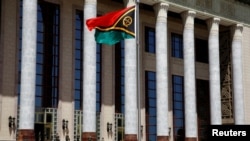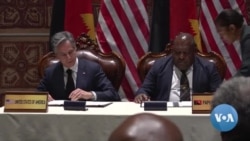Jeremiah Manele and Charlot Salwai, the prime ministers of the Solomon Islands and Vanuatu, are in China this week. Their visits come as Beijing seeks to grow its bilateral ties with the two South Pacific nations and as China is increasingly competing for influence in the region with Australia, the United States and others.
Last week, China donated a presidential building to Vanuatu while Australia and New Zealand inaugurated an airfield in the Solomon Islands. During his first overseas trip to Australia last week, Manele sought Canberra’s support to double the Solomon Islands’ police force.
The airfield and Australia’s security support are two key things analysts say China will focus on during Manele’s visit to Beijing this week.
“Everything happening in the region is viewed through a comparative lens and recent developments [in the Solomon Islands-Australia relationship] will be top of the agenda for the Chinese,” Michael Walsh, a visiting researcher at the Lasky Center for Transatlantic Studies at the Ludwig Maximilian University of Munich, told VOA by phone.
For Manele, the priority will be addressing the Solomon Islands’ economic issues, some experts say.
“[Since] the Solomon Islands’ economy is in a precarious state, Manele wants to demonstrate to Solomon Islanders that his government’s close relationship with Beijing will bring economic benefits that are tangible to their everyday lives,” Parker Novak, a nonresident fellow at the Atlantic Council's Global China Hub, told VOA by phone.
Ahead of the trips, China’s Foreign Ministry said discussions will focus on issues of mutual interest and growing relations. Foreign ministry spokeswoman Mao Ning said Manele’s trip would be a “great opportunity for the two sides to work together to further strengthen strategic communication, expand practical cooperation, and advance our bilateral ties.”
While former Prime Minister Manasseh Sogavare was in office, the Solomon Islands deepened ties with China, including signing a police cooperation agreement with Beijing.
Manele was the Solomon Islands’ foreign minister during Sogavare’s tenure, and some analysts expect he’ll maintain a similar foreign policy agenda.
“He said he would maintain the standard position of ‘being friends to all and enemies to none’ for the Solomon Islands,” said Tess Newton Cain, an adjunct associate professor at Griffith Asia Institute in Australia.
“[While] the meat and bones of Solomon Islands’ foreign policy is not going to change significantly under Manele, he will be more moderate when it comes to presenting his administration’s foreign policy agenda,” Cain told VOA by phone.
After his trip to Australia, Manele told journalists that discussions about seeking Canberra’s support to expand the Solomon Islands’ police force won’t affect the island nation’s security arrangements with Beijing.
“The arrangements with the People’s Republic of China, including the police cooperation arrangements, will remain in place,” he said, according to the Australian Broadcasting Corporation.
Following his trip to China, Manele travels to Japan to attend the 10th Pacific Islands Leaders meeting from July 16 to July 18.
Great power competition in Pacific
Despite a failed attempt to push through a regional security pact with 10 Pacific Island nations in 2022, China continues to seek opportunities to increase its influence in the Pacific.
China signed a police cooperation deal with the Solomon Islands last year and has offered to provide security support to Tonga for a Pacific Islands Forum taking place in August. Tongan Prime Minister Siaosi Sovaleni said he was considering the offer.
Meanwhile, Kiribati’s acting police commissioner, Eeri Aritiera, told the Reuters news agency in February that a Chinese police delegation would support the island nation’s community policing program and IT department, raising concerns from some U.S. lawmakers.
In January, Papua New Guinea’s foreign minister, Justin Tkatchenko, revealed that his country was engaging in early talks with China about a potential security and policing deal, prompting a senior U.S. official to warn that security guarantees offered by Beijing may come with costs.
Since China has presented itself as a security stakeholder in the Pacific region, some experts say Beijing will likely keep building security partnerships with regional countries.
“[China] seeks to deepen its presence [in the Pacific] through existing mechanisms like policing and its growing maritime presence through its coast guard fleet,” said Anna Powles, an associate professor in security studies at Massey University in New Zealand.
While China seeks to expand its security footprint in the Pacific, the United States and other democratic countries have tried to counter China’s growing security presence in the Pacific in recent years, including Washington’s efforts to sign a security agreement with Papua New Guinea in 2023.
WATCH: US and Papua New Guinea sign security pact
Despite these attempts, Walsh in Munich said China is still making inroads in several Pacific island nations, including Vanuatu, Solomon Islands, and Kiribati.
“The West doesn’t seem to have an effective response,” he told VOA.
There is also the question of whether security deals align with the needs of Pacific island countries, said the Griffith Asia Institute’s Cain.
“While Pacific island countries don’t see China as posing any military threat to them, they need to have relevant security conversations with countries [they are engaging with] in order to talk about what they are really concerned about,” she told VOA.
To safeguard their interests, Novak at the Atlantic Council said regional countries are likely to try to foster positive relationships with all external partners, whether it’s the United States, Australia, or China.
“They believe [doing so] will ensure regional stability and sovereignty,” he told VOA.




















